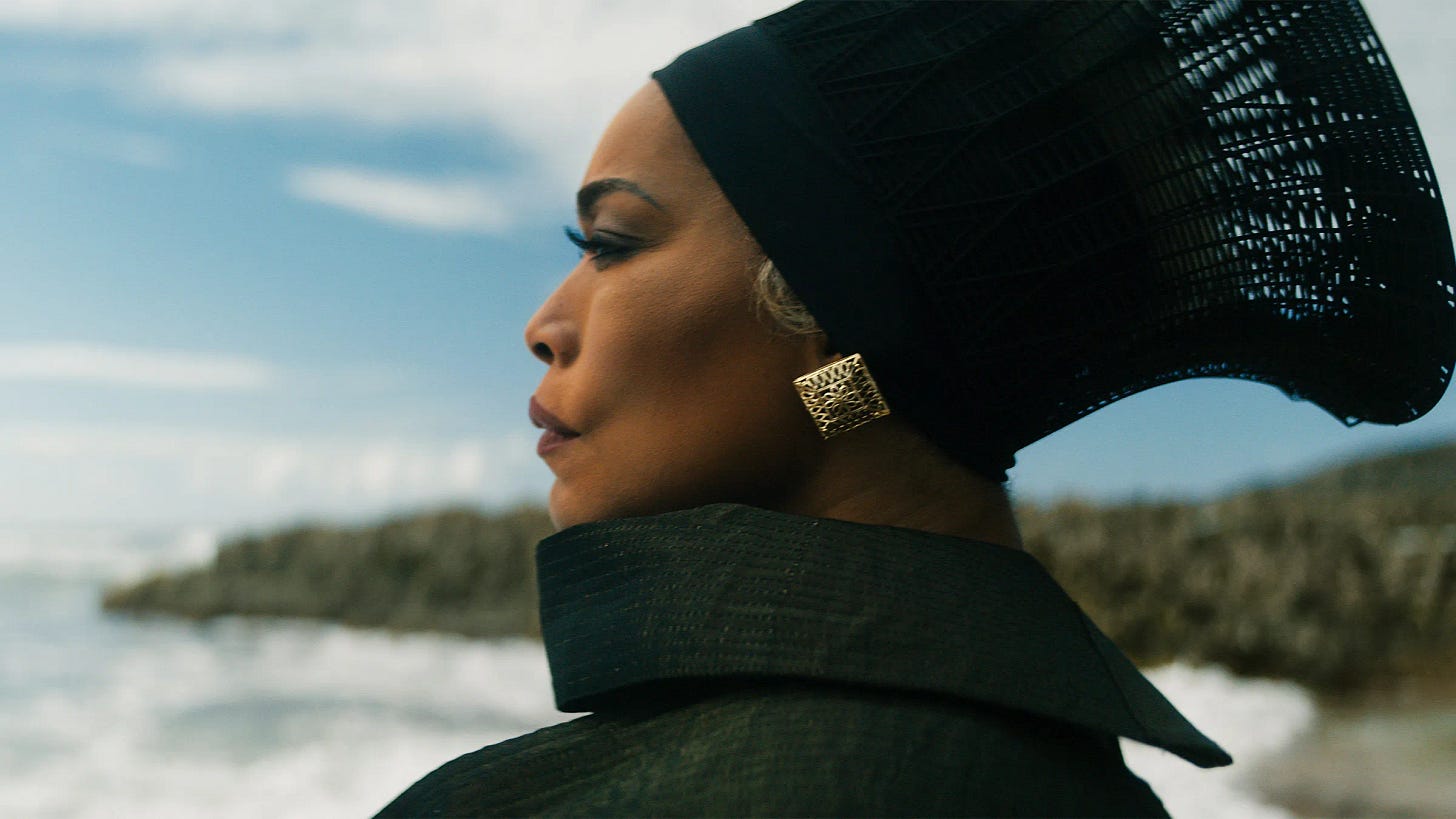Let's Talk About Angela Bassett in "Black Panther: Wakanda Forever"
An overview on Angela Bassett's performance in the new blockbuster sequel along with its place in the Oscar race.
Angela Bassett stars as Queen Ramonda in “Black Panther: Wakanda Forever.” (Disney/Marvel Studios)
**Warning: This article contains spoilers from Black Panther: Wakanda Forever**
Even as someone who is sorta superhero’d out, I was really excited for the release of Black Panther: Wakanda Forever since its predecessor remains my favorite MCU movie. After the pressure it likely felt to measure up to the original’s hype, it turned out to be just as terrific. Even if it succumbs to acting as a bridge between past and future MCU projects, for the most part, it’s able to act as its own successful entity.
But for this post, let’s talk about Angela Bassett as Queen Ramonda.
Though Angela Bassett is an actress always worth praising, her performance in Black Panther: Wakanda Forever is a specific highlight of her acting gifts. Her portrayal of the supreme nation ruler is a prime example of her ability to take full command of a scene with a gaze or a line reading. The penance stare she gives during the opening UN conference scene reveals a more shattered, weary version of the Ramonda we saw in the previous film. After losing her son T’Challa, the nation’s protector, she’s in a clear state of dismay over the safety of her people and the threat of US forces trying to colonize Wakanda for its vibranium.
Ramonda’s scarring state reaches a turning point during her show-stopping monologue shown in the film’s first trailer. The scene takes place after Okoye (Danai Gurira) loses Shuri (Letitia Wright) while on a US expedition with her. Fearing the worst has happened to Shuri, Ramonda clashes with Okoye before baring all on what she’s had to endure and manage over the years, shouting “Have I not given everything?!!!”
Although the Tribal Council advises Ramonda not to think too hastily, when thinking of what exactly she’s gone through, it’s understandable why she’d be so distressed. After losing her husband T’Chaka, she’s had to deal with losing both her children to the Blip. When they finally came back five years later, she eventually loses her son for good. With her daughter missing, she’s worried about the possibility of having to once again relive the grieving process and be left alone.
Without being hyperbolic, the scene with Bassett’s monologue is one of the most well-acted moments in the entire MCU. The way she delivers her lines with immense abandon paints a picture of an entire painful life chapter that Ramonda has dealt with.
After the first Black Panther became a smash hit that broke the glass ceiling for superhero movies in Best Picture, the Oscar hopes for its successor are inevitably called into question with Angela Bassett’s name being thrown around as a Best Supporting Actress contender.
Right now, I don’t have Bassett in my predicted five (More to come on that soon). The main reason is because it’s a stacked category rather than genre bias. There may be bias within AMPAS towards genre performances including those in comedies and horror films. However, we have seen cases of genre bias overcome time after time. We’ve even seen bias towards comic book movie performances conquered as Heath Ledger and Joaquin Phoenix both won Oscars for playing the Joker.
Like almost everyone else hoping for an Oscar nomination in January, her chances seem pretty up in the air. But what’s important is her at least remaining in the conversation. If, for example, Sigourney Weaver can earn an acting nomination for Aliens, another franchise sequel, there’s little reason Bassett can’t at least be in the Oscar conversation if her work is deemed worthy enough. Especially when Bassett is someone who’s already in the Oscar club, having last been nominated almost thirty years ago for What’s Love Got to Do With It?.
The fact that it’s been this long since her first, and thus far only, nomination is unfortunate. However, that still speaks volumes about how Black actresses, and women of color in general, often fare at the Oscars. It’s like after they break the glass ceiling to get their first nomination, that ceiling gets repaired right after as they have trouble getting a follow-up bid. Even Halle Berry, the only Black woman to win Best Actress, has yet to return as a nominee.
If Bassett were to get a second try, it’d be a small step in the right direction on top of recognition for an exemplary performance. But if it somehow doesn’t happen, then the performance remains a reminder of Angela Bassett’s sheer greatness.




